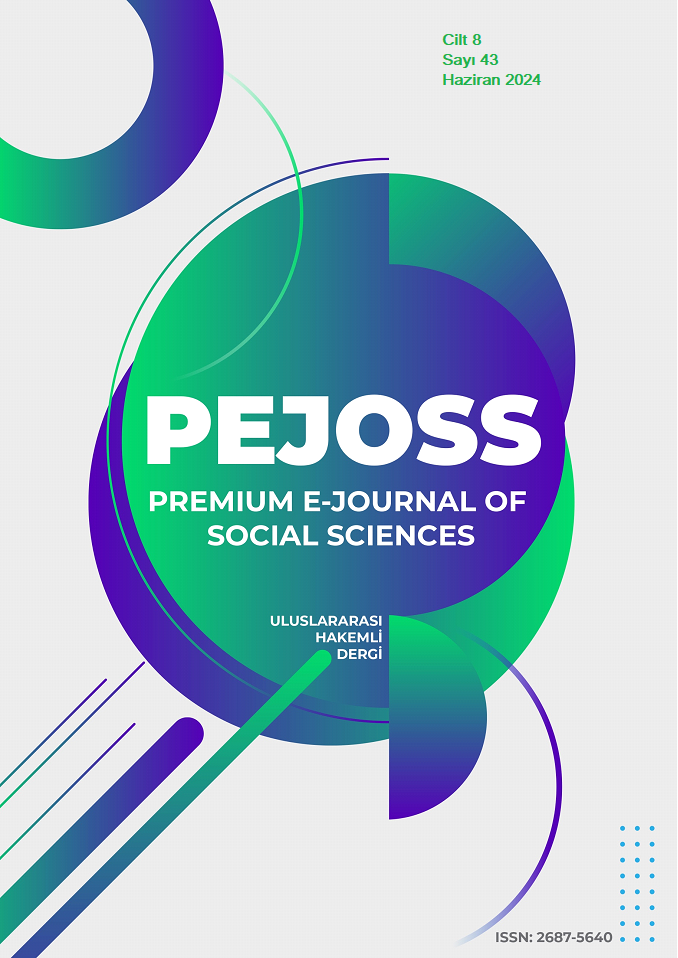Communication Problems Between Preschol Teachers and School Managers
DOI:
https://doi.org/10.5281/zenodo.12639573Keywords:
Preschool education, communication problems, preschool teachersAbstract
The purpose of this research; The aim of the study is to examine the communication problems between preschool teachers and school administrators working in independent kindergartens and kindergartens affiliated withhe Ministry of National Education in Izmir, to offer solution suggestions, and to discuss the causes, effects and solutions of communication problems. Within the scope of the study, a qualitative research method was used and semi-structured interviews were conducted. By selecting a sample among the participants; Interviews were held with 18 preschool teachers and 14 school administrators. The data obtained from the interviews were analyzed using the content analysis method. As a result of the research, it was determined that there were communication problems between preschool teachers and school administrators. These include problems such as lack of communication, difficulties in sharing information, conflict and distrust. Factors such as time constraints, role ambiguity and lack of communication skills have been identified as causes of communication problems. In the suggestion section of the study, some steps are suggested to solve communication problems between preschool teachers and school administrators. These include suggestions such as developing communication training programs, diversifying communication channels, creating cooperation and sharing opportunities, ensuring open and regular communication, and using problem solving and meditation processes.
As a result, awareness of communication problems between preschool teachers and school administrators must be increased and solution-oriented steps need to be taken. This research aims to provide guidance and support to prevent communication problems and create a healthier communication environment in preschool education institutions. By implementing the suggestions for solving communication problems, cooperation and interaction between preschool teachers and school administrators will increase, and students' educational quality and satisfaction will be positively affected.
Downloads
References
Açıköz, H. M. (2005). Etkili İletişim. Elis Yayınları.
Aydın, M. (1992). Eğitim Yönetimi. Hatipoğlu Yayınevi.
Base, R. M. (2019). What is a Case Study 2023.
Bursalıoğlu, Z. (2010). Okul Yönetiminde Yeni Yapı ve Davranış. Pegem Akademi.
Celep, C. (1992). İlkokullarda Yönetici Öğretmen İletişimi. Hacettepe Üniversitesi Eğitim Fakültesi Dergisi.
Demirel, Ö. (1989). Okul Öncesi Çağındaki Çocukların Eğitimlerinin Önemi, Ya-Pa6. Okul Öncesi Eğitimi ve Yaygınlaştırılması Semineri İçinde. İstanbul. Ya-Pa Yayınları.
Demirci, C. (2011). Okul Öncesi Yöneticilerinin Öğretmenler Tarafından Algılanan Performans Değerlendirme Sistemleri ile Öğretmenlerin Motivasyon Düzeyleri Üzerine İlişkisel Bir Araştırma. Sosyal Bilimler Enstitüsü, Yüksek Lisans Tezi, Yeditepe Üniversitesi.
Durukan, H. (2006). Okul Yöneticisinin Vizyonerlik, Liderlik Rolü. Ahi Evran Üniversitesi Kırşehir Eğitim Fakültesi Dergisi, 7(2).
Ekinci, K. (2006). Örgütsel iletişim ve örgütsel bağlılık arasındaki ilişki. Yayınlanmamış Yüksek Lisans Tezi. Erzurum. Sosyal Bilimler Ensititüsü, Atatürk Üniversitesi
Ekiz, D. (2003). Eğitimde Araştırma Yöntem Metotlarına Giriş. Anı Yayıncılık.
Erdoğan, İ. & Alemdar, K. (1998). Başlangıcından Günümüze İletişim, Kuram ve Araştırmaları. Emel Matbaası.
Gökçe, O. (2002). İletişim Bilimine Giriş (4. b.). Turhan Kitapevi.
Gürgen, H. (1997). Örgütlerde İletişim Kalitesi. Der Yayınları.
Kurt, S. (2015). Okul Öncesi Eğitim Kurumu Yöneticilerinin İletişim Becerileri. Eğitim Bilimleri Enstitüsü İlköğretim Anabilim Dalı Okul Öncesi Öğretmenliği Bilim Dalı, Çanakkale Onsekiz Mart Üniversitesi
Ludlow, R. (1992). The Essence of Effective Communication. Prentice Hall.
Maçin, E. (2010). Yönetici İletişim Becerilerinin Çalışan Motivasyonu Üzerine Etkileri, Yüksek Lisans Tezi. Sosyal Bilimler Enstitüsü, İşletme Yönetimi Anabilim Dalı, Beykent Üniversitesi.
Milli Eğitim Bakanlığı [MEB]. (2014). Okul öncesi eğitim ve ilköğretim kurumları yönetmeliği. (29072).
O'Connor, R. E. (2001). Communication for educational leaders. Allyn and Bacon.
Önder, A. (2004). Eğitici Drama Uygulamaları. Morpa Kültür Yayınları.
Peters, J. D. (1999). Speaking Into the Air: A History of The Idea Of Communication.
Sabuncuoğlu, Z., & Gümüş, M. (2008). Örgütlerde iletişim. Arıkan Yayıncılık.
Sarıyer, N. (2018). Pazarlama İletişimi Araçları. Eğitim Yayınevi.
Tekiner, Ö. (1996). Okul Öncesi Eğitimin Önemi ve Çocuğa Kazandırdıkları. Milli Eğitim Dergisi.
Tınaz, P. (2006). Mobbing: İşyerinde Psikolojik Taciz. Çalışma ve Toplum, 13-28.
Tutar, H. (2004). Genel ve Teknik İletişim. Nobel Yayın Dağıtım.
Türk Dil Kurumu Sözlük. (1992).
Ünüvar, Ş., & Bilge, F. A. (2009). Örgütsel İletişimin Bir Unsuru Olan Örgüt İçi İletişimin Konaklama İşletmelerindeki Etkinliği. Örnek Bir Alan Araştırması, Bildiri Kitapçığı, Cilt 12(1), 55.
West, R. & Turner, L. H. (2010). Introducing communication theory: Analysis and application. McGraw-Hill.
Wood, J. T. (2016). Interpersonal communication: Everyday encounters. Cengage Learning.
Yıldırım, A. & Şimşek, H. (2008). Sosyal bilimlerde nitel araştırma yöntemleri (6. b.). Seçkin Yayıncılık.
Yurdakul, R. (2007). Büyükçekmece İlçesi Ortaöğretim Kurumları Yöneticilerinin Liderlik Özelliklerinin Çalışanların Motivasyonlarına Etkisi. Basılmamış Yüksek Lisans Tezi. İstanbul.
Downloads
Published
How to Cite
Issue
Section
License
Copyright (c) 2024 Premium e-Journal of Social Science (PEJOSS)

This work is licensed under a Creative Commons Attribution 4.0 International License.


